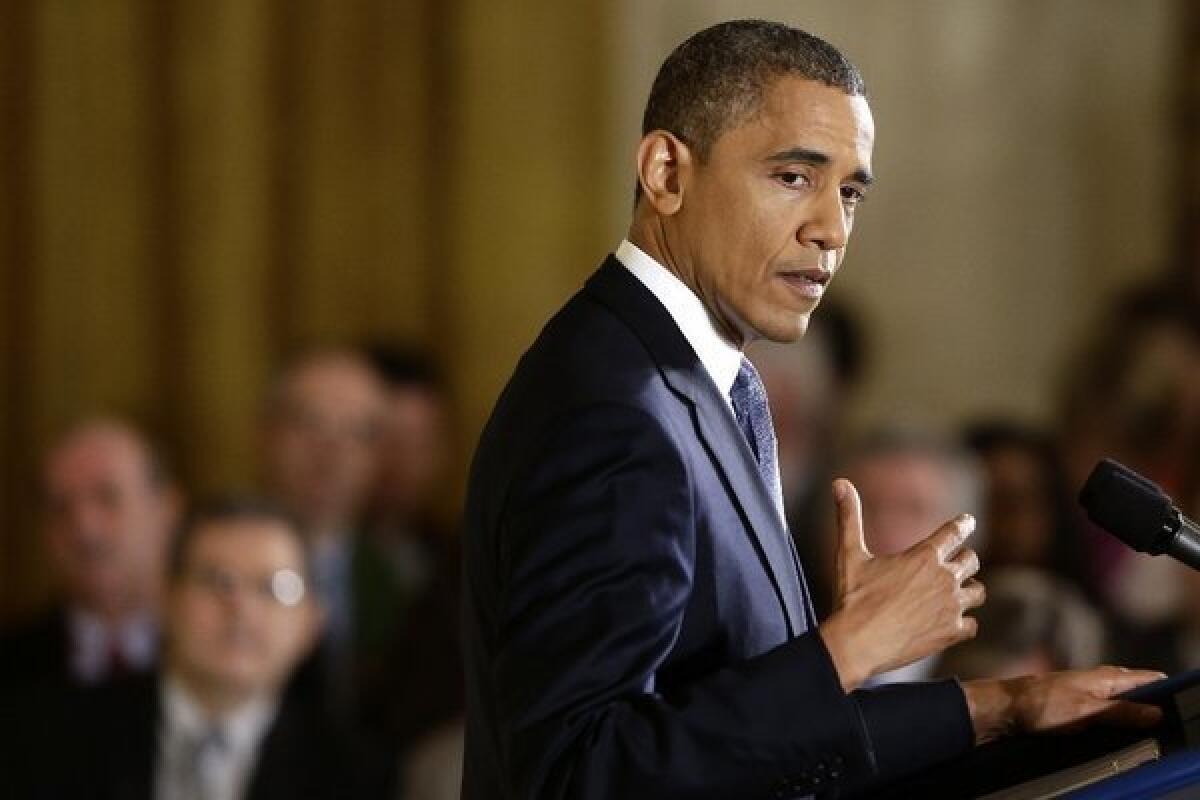Check that: President Obama does want to raise tax rates on the rich

- Share via
Well, so much for the olive branch.
Last week, analysts and pundits (including yours truly) were convinced that President Obama had signaled a clear path to compromise on taxes. Although he insisted on squeezing high-income Americans for more tax dollars, he was no longer obsessed with the idea of ending their Bush-era tax cuts. The middle ground -- or rather, the left-of-center meeting point -- would be an overhaul of the tax code that reduced the deductions, exemptions, credits and preferences for the wealthy while leaving rates intact. In fact, considering the recommendations from the likes of the Simpson-Bowles deficit-reduction commission, the feds could collect more from the wealthy while lowering marginal rates.
That appears to have been wishful thinking. Treasury Secretary Timothy Geithner started the flow of cold water Tuesday, telling corporate executives at a Wall Street Journal conference that Obama wasn’t prepared to extend the tax cuts for the top 2%. “When you take a cold hard look at the amount of resources you can raise from that top 2% of Americans from limiting deductions, you will find yourself disappointed to the relative magnitude of the revenues we need,” Geithner said, according to the Journal’s Damian Paletta.
But that was just Geithner, right? And he’s on his way out. So what does he know?
Plenty, it seems. At a White House news conference Wednesday, Obama reiterated his call for the House to pass a Senate bill renewing the Bush tax cuts for everyone making less than $200,000 (for individuals) or $250,000 (for couples). Doing so would remove “half the danger to our economy” that the “fiscal cliff” poses, Obama said. The next steps would be to simplify the tax code and reform the healthcare entitlements that are the biggest long-term budget problem. “But what I’m not going to do,” Obama said, “is to extend Bush tax cuts for the wealthiest 2% that we can’t afford and, according to economists, will have the least positive impact on our economy.”
When asked if he’d accept a plan that raises taxes on the wealthy by ending some deductions and loopholes instead of raising rates, Obama said he wanted to do both -- winnow the thicket of tax breaks and raise tax rates on the rich. “When it comes to the top 2%, what I’m not going to do is to extend further a tax cut for folks who don’t need it, which would cost close to a trillion dollars,” he said.
To preserve the veneer of bipartisanship, Obama reiterated that he would consider alternatives to higher rates. “If Republican counterparts or some Democrats have a great idea for us to raise revenue, maintain progressivity, make sure the middle class isn’t getting hit, reduces our deficit, encourages growth, I’m not going to just slam the door in their face,” he said. “I want to hear ideas from everybody.”
But like Geithner, he doubted that an alternative that only closed loopholes for the wealthy could raise as much money as jacking up their rates. And he said he wouldn’t accept a “vague” deal based on the promise of revenue to be gained by eliminating as-yet-unspecified tax breaks:
“I don’t want to find ourselves in a position six months from now or a year from now where, lo and behold, the only way to close the deficit is to sock it to middle-class families, or to burden families that have disabled kids or have a parent in a nursing home, or suddenly we’ve got to cut more out of our basic research budget that is the key to growing the economy in the long term.”
Obama’s main point is that the election was a referendum on economic plans, and his plan won. No dispute there, at least not from me. And it’s certainly true that it’s far easier to talk about eliminating credits, deductions, exemptions and preferences than it is to, you know, eliminate them. They all have constituencies that will fight hard to defend them. A tax reform that merely simplifies the code without lowering rates is an exercise in picking losers, with no winners to help push it through.
It’s possible that Obama’s remarks Wednesday were simply a perfected version of his opening bid. If he ultimately agrees not to raise tax rates on the upper brackets, it will look like a major concession, even if the agreement generates significantly more revenue by curtailing wealthy Americans’ tax breaks. In short, it becomes enough of a win-win for the GOP to sign on.
Besides, the 2010 healthcare law is already set to raise tax rates on the wealthy, increasing the Medicare portion of their payroll taxes by 1 percentage point and imposing an additional 3.8% Medicare tax on investment income. But that won’t bring in nearly as much revenue as restoring the top two tax brackets from the Clinton years, and that appears to be Obama’s bottom line in the fiscal cliff talks.
ALSO:
McManus: Reshuffling Obama’s Cabinet
Petraeus, the affair that launched a thousand letters
Follow Jon Healey on Twitter @jcahealey
More to Read
A cure for the common opinion
Get thought-provoking perspectives with our weekly newsletter.
You may occasionally receive promotional content from the Los Angeles Times.







